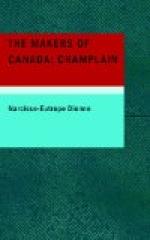The resolutions adopted at this first council meeting in the new settlement were preserved. It was decided that the nations down the river and those of the north were, for the present, at least, incapable of civilization. These tribes included the Montagnais, Etchemins, Bersiamites, Papinachois and the great and little Esquimaux. They dwelt in an uncultivated, barren and mountainous country, whose wild game and fur-bearing animals sufficed to support them. Their habits were nomadic, and excessive superstition was their only form of religion. By the report of those who had visited the southern coasts, and had even penetrated by land to Cadie, Cape Breton and Chaleurs Bay, Ile Perce and Gaspe, the country there was more temperate, and susceptible of cultivation. There would be found dispositions less estranged from Christianity, as the people had more shame, docility and humanity than the others.
With regard to the upper river and the territory of the numerous tribes of Indians visited by Monsieur de Champlain and Father Joseph themselves, or by others, besides possessing an abundance of game, which might attract the French there in hopes of trade, the land was much more fertile and the climate more congenial than in the Indian country down the river. The upper river Indians, such as the Algonquins, Iroquois, Hurons, Nipissirini, Neuters, Fire Nation, were sedentary, generally docile, susceptible of instruction, charitable, strong, robust, patient; insensible, however, and indifferent to all that concerns salvation; lascivious, and so material that when told that their soul was immortal, they would ask what they would eat after death in the next world. In general, none of the savages whom they had known had any idea of a divinity, believing, nevertheless, in another world where they hoped to enjoy the same pleasures as they took here below—a people, in short, without subordination, law or form of government or system, gross in religious matters, shrewd and crafty for trade and profit, but superstitious to excess.
It was the opinion of the council that none could ever succeed in converting them, unless they made them men before they made them Christians. To civilize them it was necessary first that the French should mingle with them and habituate them to their presence and mode of life, which could be done only by the increase of the colony, the greatest obstacle to which was on the part of the gentlemen of the company, who, to monopolize trade, did not wish the country to be settled, and did not even wish to make the Indians sedentary, which was the only condition favourable to the salvation of these heathen.
The Protestants, or Huguenots, having the best share in the trade, it was to be feared that the contempt they showed for the Catholic mysteries would greatly retard the establishment of that faith. Even the bad example of the French might be prejudicial, if those who had authority in the country did not establish order.




